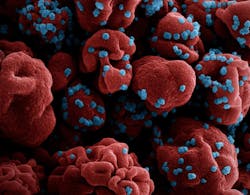Study suggests reinfections from the virus that causes COVID-19 likely have similar severity as original infection
Using health data from almost 213,000 Americans who experienced reinfections, researchers have found that severe infections from the virus that causes COVID-19 tend to foreshadow similar severity of infection the next time a person contracts the disease.
Additionally, scientists discovered that long COVID was more likely to occur after a first infection compared to a reinfection. The study, funded by the National Institutes of Health’s (NIH) Researching COVID to Enhance Recovery (RECOVER) Initiative, is published in Communications Medicine.
The analysis used data from electronic health records of 3.1 million Americans who are part of the National COVID Cohort Collaborative (N3C). Researchers focused on 212,984 people who reported a reinfection. Those individuals were originally infected between March 1, 2020-Dec. 31, 2022, and experienced a second infection by March 2023. Most participants (203,735) had COVID-19 twice, but a small number (478) had it three times or more. COVID-19 vaccines, though not available during the entire study period, correlated with a protective effect.
About 27% of those with severe cases, defined as receiving hospital care for a coronavirus infection, also received hospital care for a reinfection. Adults with severe cases were more likely to have underlying health conditions and be ages 60 or older. In contrast, about 87% of those who had mild COVID cases that did not require hospital care the first time also had mild cases of reinfections.
Reinfections were defined as having occurred at least two months after a first infection. They were found to occur most frequently when omicron variants were circulating in late 2021 and early 2022. Waning immunity and increased exposure to the coronavirus, including the highly infectious variants, likely accounted for the uptick.
Scientists also discovered that regardless of the variant, long COVID cases were more likely to occur after a first infection compared to a reinfection. Long COVID was defined in the review as those experiencing long-term COVID-19 symptoms, such as feeling tired, coughing, or having problems sleeping, breathing, or thinking, after an acute coronavirus infection.
Researchers also found that lower levels of albumin, a protein made by the liver, may indicate a higher risk for reinfection. This finding could indicate lower albumin as a possible risk marker for reinfection. Scientists believe this deserves further attention, such as by considering trials to test if nutritional interventions may prevent reinfection or its severity.

